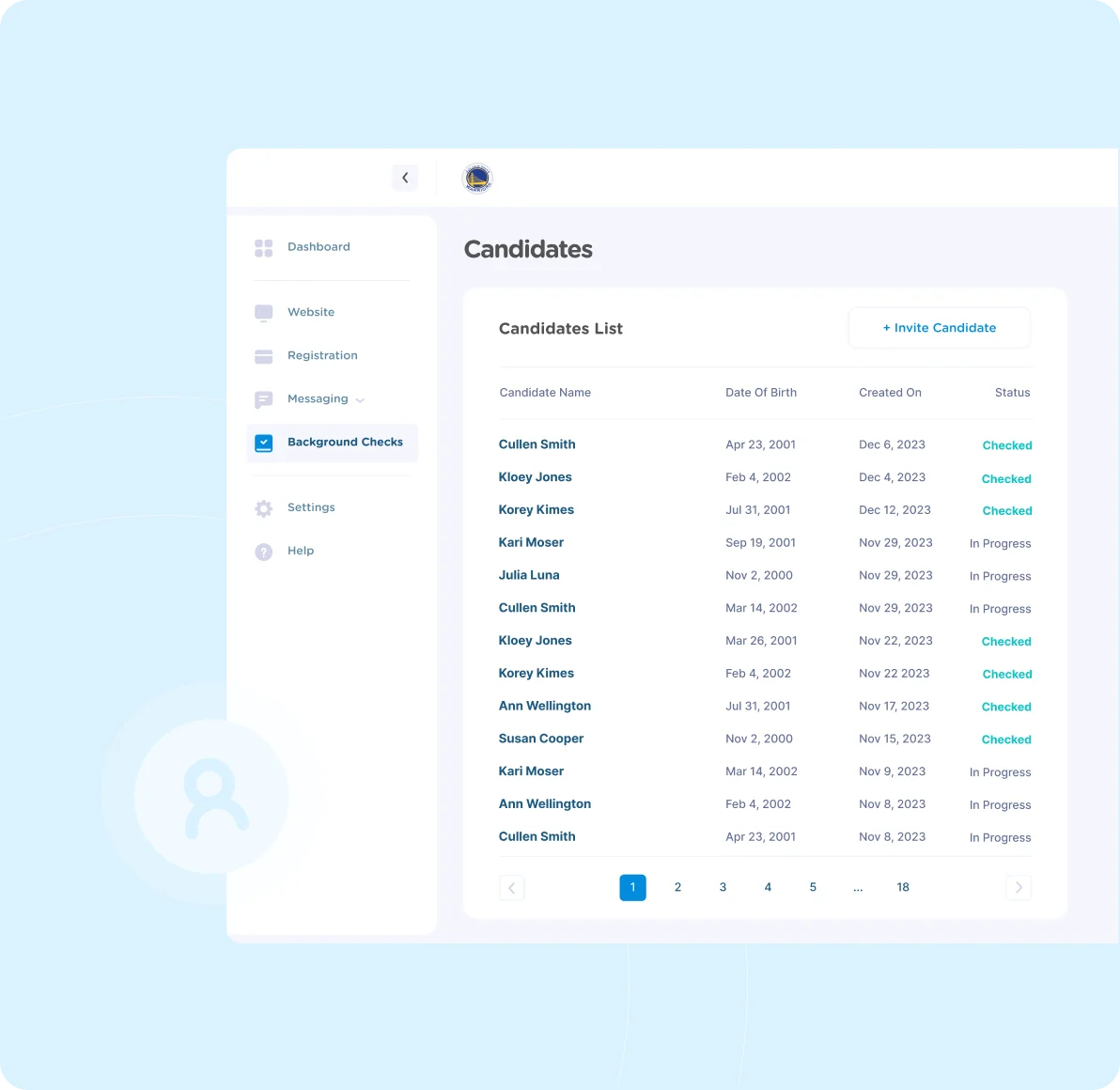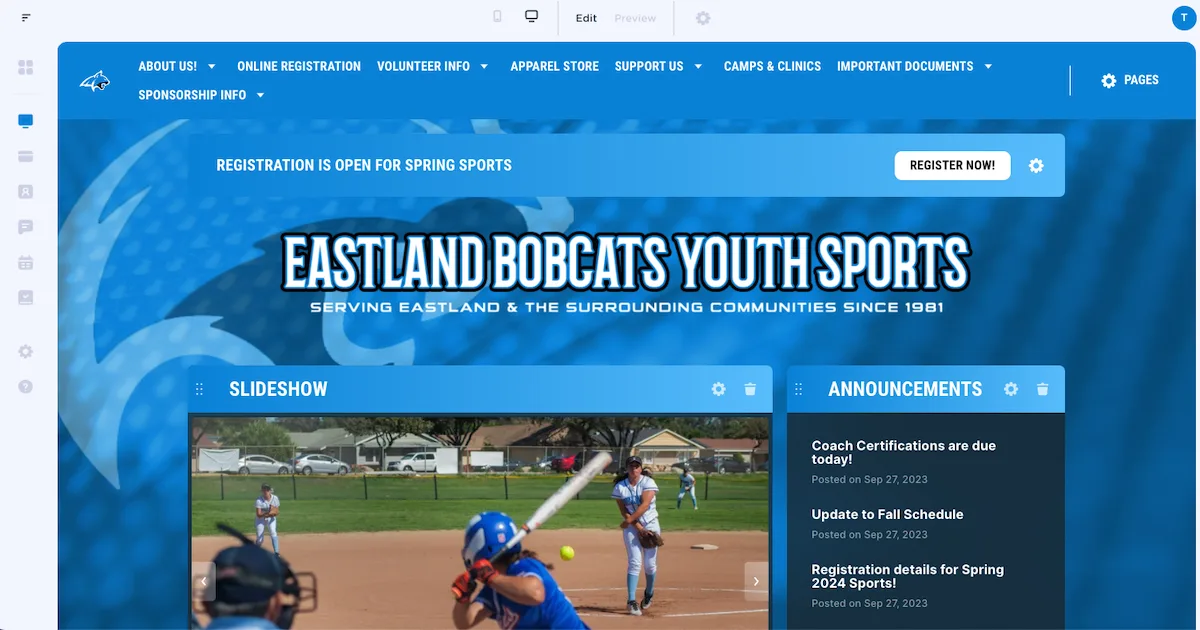
Table of Contents
In youth sports, the thrill of the game, the cheers from the sideline, and the joy in a child's face when they score their first goal are unbeatable. But behind these exciting moments, running a successful sports organization is a complex task.
From safety regulations to registration and marketing, each aspect requires careful attention to ensure a rewarding and positive experience for all involved.
This guide outlines the top practices for running a youth sports organization effectively, and how Jersey Watch can simplify these tasks, leaving you more time to focus on what truly matters – developing young athletes.
1. Prioritize player development over winning
Youth sports are not meant to turn out professional athletes, but to help children develop physically, socially, and emotionally. Most young athletes participating in sports will not go on to play professionally — and that’s okay.
Youth sports should be valued more for:
- What you learn
- The skills you develop
- The enjoyment you have.
Not your team's wins or losses.
It's important to let kids try different positions, tactics, and styles of play, even if they don't immediately succeed. Kids can learn resilience, teamwork, problem-solving, and leadership skills by focusing on player development.

Photo by Alliance Football Club on Unsplash
Consider a youth volleyball team.
🔴 If the focus is on winning…
The coach might put the strongest kids in the key positions all the time.
But what about the less physically developed kids, or the ones who are still learning the game? They end up sitting on the bench, which limits their opportunity to learn and grow.
🟢 If player development is the focus…
Each player gets a chance to play different positions and roles within the team.
The faster, stronger kid can learn new skills by playing in a defensive position. The other player might surprise everyone when given a chance to play forward. This approach guarantees everyone on the team is learning, growing, and having fun.
💡 Take Action:
- Develop a clear coaching philosophy that focuses on player development: Communicate this philosophy to your coaching staff, parents, and players. It's essential that everyone understands and supports this approach.
- Plan your coaching sessions around skill development: Ensure that each practice has clear objectives that focus on improving certain skills. Provide individual feedback to help each player understand their areas of strength and where they need to improve.
- Rotate positions: Give every player the chance to experience different roles within the team. This helps them understand the game better and discover their true potential.
- Make games and practices fun and engaging: Use a variety of drills and games that keep players interested and excited. This makes the sport more enjoyable and enhances skill development.
- Evaluate success beyond winning: Create a system for tracking player progress. Recognize and celebrate improvements in skills, understanding of the game, sportsmanship, and teamwork.
2. Ensure player’s safety
Youth sports safety is crucial to prevent injuries and promote long-term health. An unsafe environment can increase the risk of physical harm and discourage participation. Safety is key to enjoyment and progress, as well as showing care for the players' well-being.
Imagine a youth baseball team that’s always practicing with old and worn out equipment. They never learn proper batting techniques, and end up getting hurt from a faulty helmet during a game.
Compare that to a team that:
- Regularly inspects and replaces equipment.
- Teaches correct throwing and batting techniques.
- Has a trained first aid responder on hand.
The latter reduces the risk of injury. It also creates a safer, more encouraging environment for kids to learn and play. If money is holding you back, explore some of the top youth sports fundraising ideas to raise cash for your team.
💡 Take Action: Promote a safe playing culture. Educate players, coaches, and parents about safety in sports, including the importance of safe equipment, parent communication, and the potential dangers of overtraining.
3. Create a Code of Conduct
Codes of Conduct create a respectful, fair, and inclusive environment in sports. It makes sure everyone knows what their roles are and how to interact. It also helps prevent conflicts and misconduct, and addresses any issues in youth sports that may arise.
Say you're running a youth basketball team. With a Code of Conduct in place, players, parents, and coaches know what’s expected of them. They show respect to everyone, accept decisions made by referees, and control their emotions during games.
💡 Take Action: Communicate the Code of Conduct. Ensure everyone involved in the organization is aware of and understands it. You can explain the CoC during meetings, add it to written materials, or upload it to your youth sports website.
👉 Download the a youth sports Code of Conduct template. It’ll have all the necessary information to use right away. You can add more points if you’d like.
4. Maintain regular communication
A youth sports organization's success depends on consistent, clear communication.
It keeps everyone—players, parents, coaches, board of directors, and administrators—informed of schedules, calendar changes, expectations, and any issues. Having good communication also fosters a sense of community, builds trust, and keeps things running smoothly.
Say you run a soccer league and you send out information about team schedules randomly, often last minute. It leaves parents feeling uniformed and frustrated, which can lead to missing practice or a game.
Compared to if you sent out weekly emails, updated your website, and texted parents. It'd be much more organized and less stressful for parents, players, and you.
That’s where a sports team management app like Jersey Watch helps. Parents and coaches can get updates from you via text and email during the season, like scheduling changes, volunteer requirements, and anything else they need to know.
⚡ Pro Tip: Encourage feedback and make it easy for parents, players, and coaches to raise concerns or ask questions.
5. Run background checks for coaches and volunteers
Conducting background checks on coaches and volunteers is important for youth sports. Make sure during the volunteer sign-up process, expectations around player safety are clearly stated.
Background checks make sure people working with children have a clean record and are fit to work with kids. It's about putting kids' safety and welfare first, keeping parents' trust, and maintaining your organization's reputation.
Clearly outline:
- Who needs a background check
- When and how to carry out these checks
- What the consequences are for failing a check.
With Jersey Watch, you can run background checks on coaches and volunteers to keep athletes safe during your season.

6. Have a professional website
Professional websites are the digital face of a youth sports program. It's a place where you can share information, communicate with your community, and promote your organization.
A well-structured, up-to-date website shows that your organization is reputable and organized, which builds confidence among parents and local companies that sponsor youth sports.

Example of youth sports website built using Jersey Watch
Find a website builder that's fast and easy to use if you want to make a sports website. You should be able to build a website in 30 minutes, and maintain it in a few minutes per week.
Once you have an account, be sure to:
- Provide essential information: This includes contact details, registration information, a calendar of events, coach bios, and your organization's mission statement and policies.
- Promote your achievements: Showcase your organization's successes, such as player advancements, tournament wins, or community service projects. This creates a positive image of your organization.
7. Handle payments and registration online
Gone are the days of going to the league office to register young athletes.
Online payments and registration streamline your youth sports organization's administrative processes. Parents can register and pay their children anytime, anywhere. Besides that, it reduces your workload and improves record-keeping.
Imagine a parent coming on your website to fill out forms and make payments at their convenience. What a treat—for you and them. Talk about reducing administrative burden.
With Jersey Watch, an online registration feature is built into your website. Players' parents can see all the programs their kids can join at once, fill out online forms, and pay online. It’s secure and can manage multiple payment methods that credit and debit cards.
8. Encourage continuous education for coaches
Youth sports coaches need to keep learning and growing if they want to stay effective.
Sports are constantly evolving, and new techniques, philosophies, and science are being introduced that impact coaches. Coaches need continuous education to stay updated and serve their players better.

Photo by Adrià Crehuet Cano on Unsplash
Some ways to promote this include:
- Encourage certification and training: Promote relevant certifications and encourage your coaches to take part in training sessions or courses. You can even have coaches acknowledge codes of conduct or sign coaching contracts.
- Host regular coaching clinics: Recruit experienced coaches to run workshops for your youth sports league.
- Create a resource library: This can include books, articles, videos, and online courses about coaching techniques, sport science, child development, and more.
- Promote peer learning: Encourage coaches to share their knowledge and experiences with each other. This could be done through regular meetings, an online forum, or a mentorship program.
9. Focus on community engagement
Running a successful youth sports club requires community engagement. The goal is to build relationships and gain support for your organization through active involvement.
Picture two youth softball organizations:
One frequently hosts community events, partners with local businesses, and engages parents in various roles. The other focuses solely on running practices and games, with no community outreach.
The first organization enjoys a strong community backing. They get enthusiastic crowds at their games, parent volunteers, and local business sponsorships. The second struggles to gain the same level of support and visibility from people.
Here’s how to build community engagement:
- Host community events: Organize events like family fun days, charity runs, or awards ceremonies. This strengthens ties with the community and promotes your organization.
- Engage parents and volunteers: Give roles for parents and community members, such as coaching assistants, sporting event organizers, or team managers.
- Partner with local businesses: Make partnerships with local businesses for sponsorships, discounts, or services in kind.
- Promote your activities: Regularly share updates about games, player achievements, and events through your website, social media, or local media outlets.
- Support local causes: Participate in local initiatives or charities to show that your organization is part of the wider community. This could be fundraising for a local charity or participating in community clean-up events.
10. Consider filing as a nonprofit organization
Incorporating as a nonprofit can provide several benefits for a youth sports organization. A nonprofit status:
- Offers legal protections.
- Make you eligible for certain types of grants and donations.
- May provide tax benefits.
Incorporation adds credibility to your organization and can be appealing to potential donors. If you want to become a nonprofit sports organization:
- Understand the requirements: Familiarize yourself with local and federal requirements for becoming a nonprofit. Consult a legal expert to help with the process.
- Create a nonprofit corporation: Incorporate your organization as a nonprofit with your state. This typically involves filing articles of incorporation and paying a filing fee.
- Develop bylaws and a board of directors: Nonprofits are required to have bylaws and a board of directors. Make sure your bylaws fit your organization and that your board members are committed and competent.
- Apply for tax-exempt status: Once incorporated, apply for tax-exempt status from the IRS by filing Form 1023. Note that the process can take several months.
- Stay compliant: Nonprofits must adhere to specific rules to maintain their status. This includes filing annual reports, holding board meetings, and avoiding profits benefiting individuals.
Grow a successful youth sports organization with Jersey Watch
Running a successful youth sports organization is more than just game day logistics. It’s about keeping players safe, communicating with parents and coaches, and running the marketing side of things, too.
Managing these tough operations is easier with Jersey Watch, a tool made just for youth sports organizations. We help you streamline registration, improve communication, and build an online presence, leaving you with more time to create a positive, community-focused sports environment.